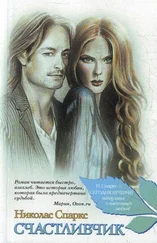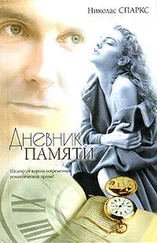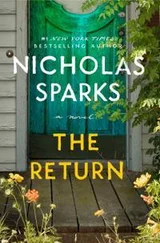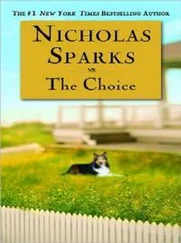“Because it is the story of us,” she says. “And I want to hear about you.”
My mind spins again. The side of my face hurts where it presses against the steering wheel, and I notice that my broken arm looks bizarrely swollen. It has turned purple and my fingers look like sausages. “You know how it ends.”
“I want to hear it. In your own words.”
“No,” I say.
“After sitting shiva, the depression set in,” she goes on, ignoring me. “You were very lonely. I did not want this for you.”
Sorrow has crept into her voice, and I close my eyes. “I couldn’t help it,” I say. “I missed you.”
She is silent for a moment. She knows I am being evasive. “Look at me, Ira. I want to see your eyes as you tell me what happened.”
“I don’t want to talk about this.”
“Why not?” she persists.
The ragged sound of my breath fills the car as I choose my words. “Because,” I finally offer, “I’m ashamed.”
“Because of what you did,” she announces.
She knows the truth and I nod, afraid of what she thinks of me. In time, I hear her sigh.
“I was very worried about you,” she finally says. “You would not eat after you sat shiva, after everyone went away.”
“I wasn’t hungry.”
“This is not true. You were hungry all the time. You chose to ignore it. You were starving yourself.”
“It doesn’t matter now —,” I falter.
“I want you to tell me the truth,” she persists.
“I wanted to be with you.”
“But what does that mean?”
Too tired to argue, I finally open my eyes. “It means,” I say, “that I was trying to die.”
It was the silence that did it. The silence that I still experience now, a silence that descended after the other mourners went away. At the time, I was not used to it. It was oppressive, suffocating – so quiet that it eventually became a roar that drowned out everything else. And slowly but surely, it leached me of my ability to care.
Exhaustion and habits further conspired against me. At breakfast, I would pull out two cups for coffee instead of one, and my throat would clench as I put the extra cup back in the cupboard. In the afternoon, I would call out that I was going out to retrieve the mail, only to realize that there was no one to answer me. My stomach felt permanently tense, and in the evenings, I couldn’t fathom the idea of cooking a dinner that I would have to eat alone. Days would pass where I ate nothing at all.
I am no doctor. I do not know if the depression was clinical or simply a normal product of mourning, but the effect was the same. I did not see any reason to go on. I did not want to go on. But I was a coward, unwilling to take specific action. Instead, I took no action, other than a refusal to eat much of anything, and again the effect was the same. I lost weight and grew steadily weaker, my path preordained, and little by little, my memories became jumbled. The realization that I was losing Ruth again made everything even worse, and soon I was eating nothing at all. Soon, the summers we spent together vanished entirely and I no longer saw any reason to fend off the inevitable. I began to spend most of my time in bed, eyes unfocused as I gazed at the ceiling, the past and the future a blank.
“I do not think this is true,” she says. “You say that because you were depressed, you did not eat. You say that because you could not remember, you did not eat. But I think that it is because you did not eat that you could not remember. And so you did not have the strength to fight the depression.”
“I was old,” I say. “My strength had long since evaporated.”
“You are making excuses now.” She waves a hand. “But this is not a time to make jokes. I was very worried about you.”
“You couldn’t be worried. You weren’t there. That was the problem.”
Her eyes narrow and I know I’ve struck a nerve. She tilts her head, the morning sunlight casting half her face in shadow. “Why do you say this?”
“Because it’s true?”
“Then how can I be here now?”
“Maybe you aren’t.”
“Ira…” She shakes her head. She talks to me the way I imagine she once talked to her students. “Can you see me? Can you hear me?” She leans forward, placing her hand on my own. “Can you feel this?”
Her hand is warm and soft, hands I know even better than my own. “Yes,” I say. “But I couldn’t then.”
She smiles, looking satisfied, as if I’d just proved her point. “That is because you were not eating.”
A truth emerges in any long marriage, and the truth is this: Our spouses sometimes know us better than we even know ourselves.
Ruth was no exception. She knew me. She knew how much I would miss her; she knew how much I needed to hear from her. She also knew that I, not she, would be the one left alone. It’s the only explanation, and over the years, I have never questioned it. If she made one mistake, it was that I did not discover what she had done until my cheeks had hollowed and my arms looked like twigs. I do not remember much about the day I made my discovery. The events have been lost to me, but this is not surprising. By that point, my days had become interchangeable, without meaning, and it wasn’t until darkness set in that I found myself staring at the box of letters that sat upon Ruth’s chest of drawers.
I had seen them every night since her passing, but they were hers, not mine, and to my misguided way of thinking, I simply assumed they would make me feel worse. They would remind me of how much I missed her; they would remind me of all that I had lost. And the idea was unbearable. I just could not face it. And yet, on that night, perhaps because I’d become numb to my feelings, I forced myself from the bed and retrieved the box. I wanted to remember again, if only for a single night, even if it hurt me.
The box was strangely light, and when I lifted the lid, I caught a whiff of the hand lotion Ruth had always used. It was faint, but it was there, and all at once, my hands began to shake. But I was a man possessed, and I reached for the first of the anniversary letters I’d written to her.
The envelope was crisp and yellowing. I’d inscribed her name with a steadiness that had long since vanished, and once again, I was reminded of my age. But I did not stop. Instead, I slid the brittle letter out of its sleeve as I maneuvered it into the light.
At first, the words were foreign to me, a stranger’s words, and I did not recognize them. I paused and tried again, concentrating on bringing the words into focus. And as I did, I felt Ruth’s presence gradually take shape beside me. She is here, I thought to myself; this is what she’d intended. My pulse began to race as I continued to read, the bedroom dissolving around me. Instead, I was back at the lake in the thin mountain air of late summer. The college, shuttered and forlorn, stood in the background as Ruth read the letter, her downcast eyes flickering across the page.
I’ve brought you here – to the place where art first took on true meaning for me – and even though it will never be the same as it once was, this will always be our place. It’s here that I was reminded of the reasons I fell in love with you; it was here where we began our new life together.
When I finished the letter, I slipped it back into the envelope and set it aside. I read the second letter, then the next, then the one after that. The words flowed easily from one year to the next, and with them came memories of summers that in my depression I had been unable to recall. I paused when I read a passage that I’d written on our sixteenth anniversary.
I wish I had the talent to paint the way I feel about you, for my words always feel inadequate. I imagine using red for your passion and pale blue for your kindness; forest green to reflect the depth of your empathy and bright yellow for your unflagging optimism. And still I wonder: can even an artist’s palette capture the full range of what you mean to me?
Читать дальше











![Николас Спаркс - Каждый вдох [litres]](/books/414723/nikolas-sparks-kazhdyj-vdoh-litres-thumb.webp)
